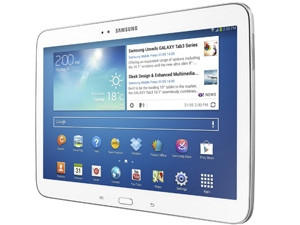
Samsung yesterday announced its new Galaxy Tab 3 series of tablets, consisting of an eight-inch and 10-inch tablet. According to The Verge, the 10.1-inch Galaxy Tab will be powered by an Intel 1.6GHz dual-core processor.
The Korean manufacturer confirmed this to The Verge yesterday, stating it had "sourced components, including chipsets, from trusted partners" to maintain a "consistent high-quality experience for customers".
The 10.1 Galaxy Tab features a 1 280 x 800 (149 PPI) WXGA TFT display, has 16GB or 32GB of internal storage and 1GB of RAM. It also has a 3MP rear camera. Both tablets will be made available globally from this month but pricing details have not been revealed.
Samsung SA says it does not have exact details on pricing and local availability for the new range of Galaxy tablets.
Tried and trusted
The move has been seen as unusual, as Samsung manufactures its own processors and uses mobile processors from market leader, Qualcomm, for its premium devices.
Tech analyst Liron Segev says Intel's reputation and legacy is what is keeping its processors alive in the slowing PC industry. "Even people who are not necessarily part of the tech world will know exactly what you are talking about if you mention Intel. It did superb marketing when it was powering PCs, but Qualcomm is not on the same level when it comes to marketing."
Segev adds that Qualcomm does, however, have a proven record in the mobile sphere. "If you're a developer, you have access to all the innovative projects that Qualcomm offers, making the development process a lot easier. They are also putting their chips into more mobile devices and other machines as it's such an attractive ecosystem for developers."
He says the battle between Qualcomm and Intel is officially on. "Entering the mobile processor market a bit later than everyone else has given Intel the advantage to rectify mistakes, smooth out the bumps, and skip right to a quality end-product."
Segev warns Intel could possibly have a hard time convincing smartphone manufacturers to switch. "They have grown up with Qualcomm, they know what it can do and they build their handsets around that. So there's no real reason for them to change unless Intel comes up with something that will 'wow' them."
Push to mobile
Intel has led the computer market for decades, but mobile competitors like Qualcomm and Samsung have taken the lead in supplying processing chips to the booming tablet and smartphone market.
Last month, Reuters reported that Intel's new CEO Brian Krzanich said the chipmaker will intensify its focus on the smartphone and tablet market, where it lags behind its rivals.
"Yes, we missed it; we were slow to tablets and some of the mobile computing. We do believe we have a good base," Krzanich told shareholders at an annual meeting.
Krzanich said he and software honcho Renee James had already started meeting with manufacturing customers.
"They're all showing us - here's where the market's moving and here's where we need Intel to move. We're going to make adjustments in our architecture and our product choices."
Intel's Atom processor does, however, currently power 12 smartphones, including the Lenovo K900 and Motorola Razr i.
Share